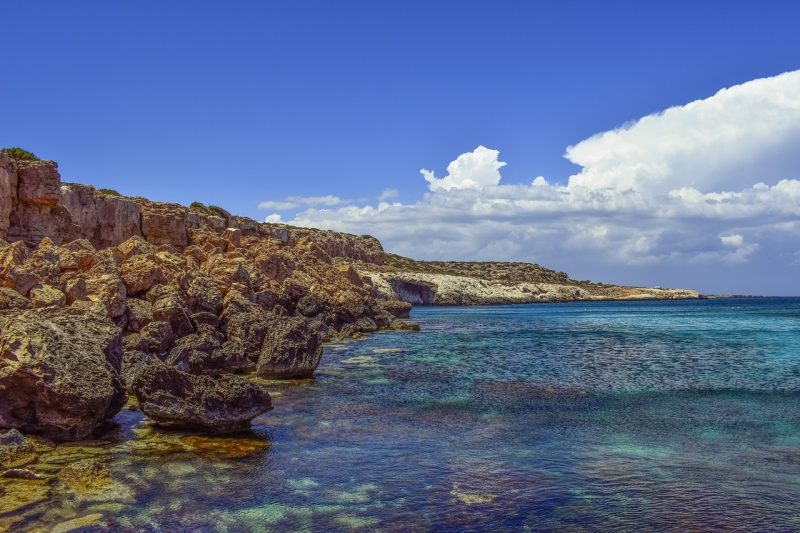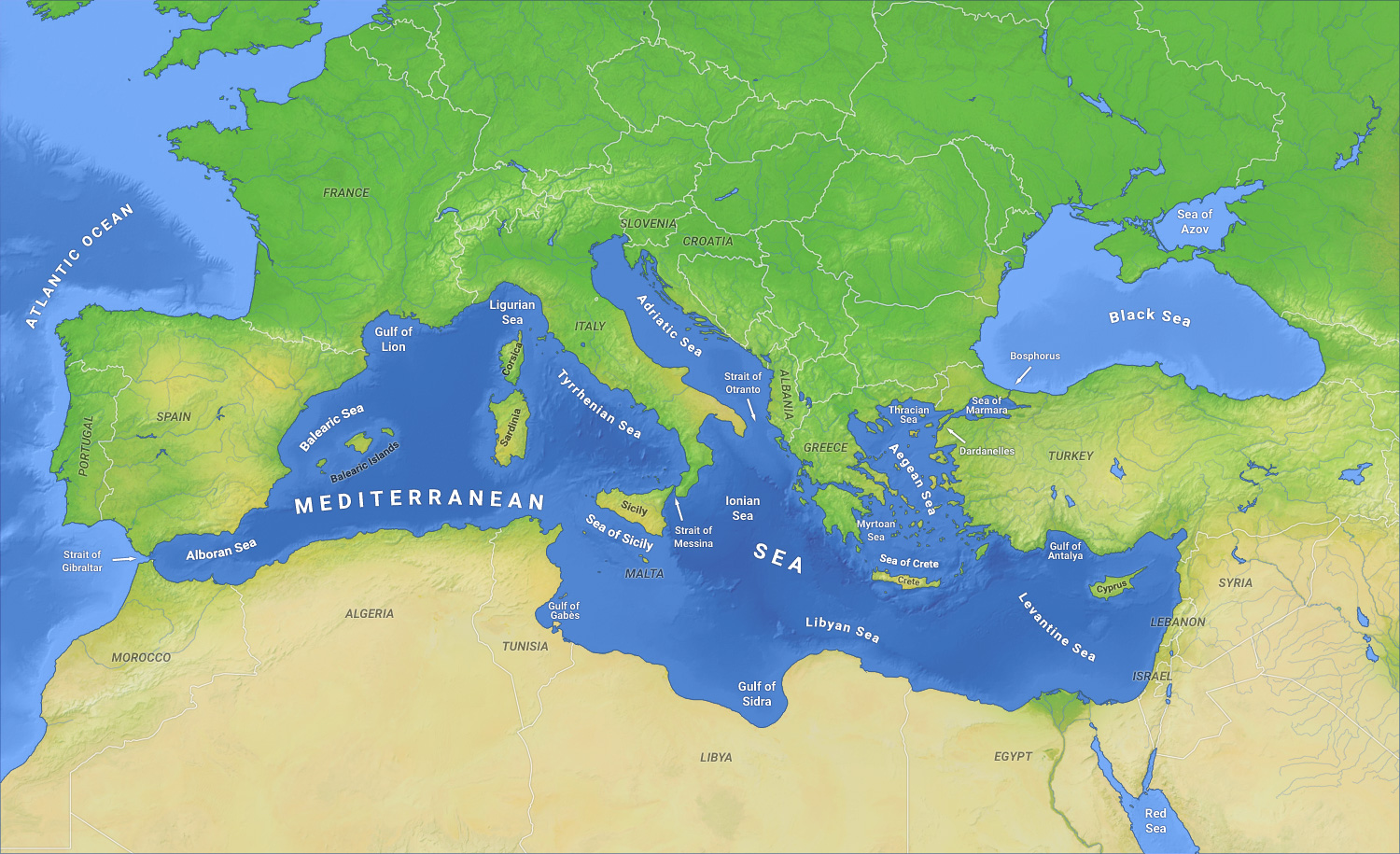On May 12, 2020, the US Ambassador to Nicosia, Judith Garber, visited the Commander of the Greek National Guard Army (GNG), Lieutenant General Democritus Zervakis, in Cyprus. Before her departure, the pair posed in front of a wall painting of Kyrenia (Girne) in his office. It was an interesting sight. The president of the Board of Directors of BAU Cyprus University, Eral Osmanlar, from the Turkish Republic of Northern Cyprus (TRNC), clearly explained Zervakis’ psychology in this photo: “Like a little boy standing in front of a poster of a sports car he will never own”. Ms. Garber’s situation is more sympathetic: she is like a tender sister trying to make her little brother happy at the amusement park.
This photo is the latest expression of a rapidly growing wedge between Turkey and the US since Fall, 2016. The scene showcases the new geopolitical reality in the post-Cold War era and sends a message to an ascendant Turkey in the Eurasian landscape of the 21st century to keep clear of the Eastern Mediterranean and Cyprus. The visit and the posing in front of cameras is the latest sign that the US is associated with the opposite camp and is no longer a reliable mediator or quarterback for Turkey in the so-called Cyprus peace process, Eastern Mediterranean and Aegean issues. What a coincidence that the putschist Nicos Sampson, the puppet of the military junta in Athens on July 15, 1974, had dreamed of Girne in his Paris memoirs. He wrote: “Turks will definitely be expelled from Cyprus, with blood-shed or otherwise. Turkish army will be driven to the sea one day. We will wipe Turks out of Cyprus. On that day, we will sip our coffees in Kyrenia”.
PRESSURE IS MOUNTING ON TURKEY
Geopolitical fault lines are rapidly fracturing. With each passing day, the imperialist front, as if to justify the analogy of “monster left with a single tooth” follows a discourse to dial up pressure on Turkey. The anti-Turkey alliance representing Muslim, Catholic, Orthodox and Hebrew faith groups is harmoniously working together to strain and turn the tables on Turkey in the Eastern Mediterranean and the Aegean. Two days before Ambassador Garber’s visit, Foreign Ministers of the Greek Cypriot Administration (GCA), Greece, Egypt, France, and UAE issued a joint statement not only to criticize, but also to threaten Turkey for its acts in North Cyprus, the Eastern Mediterranean, Libya, and the Aegean Sea. Just three months ago, between January 27 and February 7, 2020, the US, Greece, and France made Turkey the target in an exercise entitled “Alexander 2020” in the Eastern Mediterranean and the Aegean Sea, where one scenario involved recapturing the island of Skyros from the enemy (Turkey) by military operations.
The US Embassy in Athens distributed photos of US naval units that participated in the exercise on its Twitter account. On the last day, large financial funds in the US, Greece, and Israel announced cooperation to assist shipbuilding in Greece. During the exercise, on January 31, 2020, an agreement on “US-Greece Mutual Defense Cooperation” passed through the Greek Parliament. The agreement was approved by the votes of 175 deputies in favor against 33 rejections, thereby providing unlimited access to Greece’s Larissa, Stefanovic and Alexandroupoli military bases and facilities for the US. Moreover, the creation of an American naval base in Crete / Suda was approved.

JINSA REPORTS
2020 has been a fruitful year for the Greek-US marriage. At the end of January, JINSA (Jewish Institute for National Security of America), one of the leading Neocon think tanks in the US, published a report titled “US & Greece: Cementing A Closer Strategic Partnership” suggesting to significantly develop closer military cooperation between the two countries. The project was launched under the presidency of the former US Ambassador to Ankara, Eric Edelman, and includes the former SACEUR (NATO Supreme Allied Commander in Europe), Gen. Philip Breedlove, seven retired generals, admirals, and vice admirals, four former high-ranking bureaucrats from the US administration, and Alan Makovsky – a well-known figure in Turkey.
For those who are interested, a JINSA document published in August 2019 titled “Changes at Sea: Threats and Opportunities for the US in the Eastern Mediterranean” could be considered as a follow-up to the document titled “Restoring the Eastern Mediterranean as a US Strategic Anchor” published on May 22, 2018 by the CSIS, another prominent US think-tank.
DOCUMENTS BECOME REALITY
The 2018 CSIS document proposed a four-way alliance between the US, Israel, Greece, and the GCA. The best evidence of the fact that publications by think-tanks in the US eventually became official state policy was the implementation of the two aforementioned CSIS reports. Each of the three US-led documents stipulate to undermine Turkish geopolitical interests, especially in the Blue Homeland; in Cyprus, Libya, Syria, and the Eastern Mediterranean. The latest JINSA report titled “US and Greece: Developing Closer Strategic Cooperation” emphasizes that support for Greece and Southern Cyprus should be put into action. It proposes that the US engage in deeper military cooperation with Greece in order to project power and maintain regional stability in the Eastern Mediterranean.
In this context, Greece and the GCA (Greek Cypriot Administration) are seen as one and a whole. It recommends providing all kinds of support to the four-way alliance system with Israel and Egypt; and political, legal and military contribution to American companies investing in the so-called natural gas license areas of the GCA. It features US-Greek relations at its climax, suggests to develop relations between military counterparts, to allocate a large portion of FMF (Foreign Military Finance) loan to Greece for purchasing US arms, and to extend a similar practice a GCA, on which the arms embargo was lifted last year.
The document also emphasizes the importance of increasing US military presence in Greece, primarily in Alexandroupoli naval and airbase, and other forward bases. In the final analysis, considering the enthusiasm in Greece and the GCA, it recommends re-deploying B61 nuclear bombs in Incirlik (Turkey); Kürecik (Turkey) TPY / 2 Ballistic Missile Defense Radar System; and to transfer air-refuel tanker planes and Airborne Early Warning Planes (AWACS) to Greece, Southern Cyprus, or British Sovereign Bases. In this context, it points to the example of Germany’s withdrawal from Incirlik and subsequent re-commissioning of its units in Jordan.
US-GREECE COOPERATION INCREASES INSTABILITY
Even though Greece joined the Atlantic camp as a valuable member of the ‘rimland’ in the aftermath of World War II due to a partition agreement between Churchill and Stalin, it harbored a left-wing, anti-American political climate in a general sense. This changed after its EU membership. Today, Greece has thrown open its doors and hearts to the US in its entirety by using the alleged ‘Turkish threat’ as an excuse. In fact, it can be said that Greece is under a new type of ‘benign occupation’. It is yet to be seen whether history will repeat itself in this regard. When, at the end of World War I, under reassurance and directives of the then US President Wilson and British Prime Minister Lloyd George, the Greek army landed on Izmir, the former Navy Minister Churchill had commented along the lines of “What have we done? The Turks will fight now indeed”. Greece does not stand to gain from imperialist support when attempting to come to terms with Turkey.
I would like to remind you of the mutually beneficial political climate supported by the friendship between Venizelos and Ataturk, when Italian fascism stood on its door in the 1930s. Greece cannot solve Aegean and Eastern Mediterranean problems by relying on America, doing so will only bring mutual escalation and eventual destruction. The only thing to remain constant no matter which government is Turkish geopolitics. No authority in Turkey disputes boundaries of the Blue Homeland in the Aegean and the Eastern Mediterranean.
Turkey will not surrender its maritime jurisdiction in the Eastern Mediterranean and Aegean to imperialism, as these borders are guarded not for the living generations but for the future. As I often remind my readers, Turkey has become a maritime nation. The Turkish state apparatus has elevated maritime geopolitics to top priority, especially after the end of the Cold War. To expect a backtrack from this vision is futile. Greece and the GCA have to face this albeit difficult reality. It seems that they still contemplate managing a complex process. However, they cannot move from chaos to a crisis management phase. It is not possible for them to manage the crisis through a system of alliances. The crisis can only be solved by sitting at the negotiation table with Turkey.
WASTED EFFORTS
The US is wasting effort by pitting neighbors on each other and contributing to instability in the Middle East and the Eastern Mediterranean instead of focusing on the Pacific and Arctic basins where the 21st century’s most serious power struggle is to take place. Washington can print dollars readily and taxpayers might not raise any questions, but it should be noted that stability in the Eastern Mediterranean cannot be instituted by modern bullying tactics as frequently mentioned in JINSA and CSIS reports adorned with firepower, new bases, power projection, armed UAVs, military rotations, weapon sales, and similar perceptions and concepts tailored towards hard-power instruments.
If the US is serious about helping Greece and the GCA, it would be better to instruct them and their advisors to learn to live with Realpolitik in the spirit of time: let the Greeks learn to build friendship ties with the Turks. On the other hand, Turkish Ministry of Foreign Affairs should break the recent passive approach and launch new diplomatic initiatives, especially with Egypt, Lebanon, Israel and Syria.

















Leave a Reply